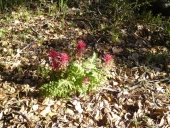posted 15 years ago
I am moving out onto an off grid piece of land in Appalachian Ohio some time this summer.
The features... The top of a large hill, covered in great looking pasture, slopes down into ay shallow valley, that has small trickles of water running through it, even at the end of this April, which gave us almost no rain at all. At the top of the hill, deer have dug pits about 2 feet deep and 2 feet across that are filled with small bits of water, at the top of a hill!
The soil is brown clay.
The shallow valley then overflows into a deep valley, with a small creek.
Growing there now are mainly, black wallnuts, shagbark hickories, honey locusts, hawthorns, eleagnus, black rasberies, crabapples and white oaks. At least as extremely useful trees go. There are also some tulip polars and a bunch of random semi useful trees.
The place is 19 acres.
This year we want to build a mid sized barn, enough for 3 cows and 10 goats and their offspring, a pig and chicken house, a greenhouse, a cabin and a pond.
Next year I plan to grow enough food that should I need, I can rely upon through the winter.
Fingerling potatoes, potato onions, garlic, elephant garlic, parsnips, sunchokes, beats, dahlias, sweet potatoes, cabbage and winter squash will be my main crops.
I am mulling over, different breeds of cows... Guernsey, Brown Swiss, Irish Dexter and Scot Highlander are all available in the area.
What are the most important tree crops we should get going? We really want to do a hugelculture of kiwi vines. I think we probably want to grow a bunch of chestnuts... gooseberries, mulberries, persimmons, medlars, pears, sea buckthorn, a species of forage willow, kudzu, johnson grass, apricots, peaches, nanking cherries, service berries, aronia, hazlenuts, giant red clover, hairy vetch, forage radish, perennial ryegrass, gamma grass...
I am going to bring a bunch of poultry netting and a solar fence charger, plus some wire and stakes for the pigs.
I want to do egg ducks (breeding up into runner ducks), muscovies, geese, some chickens, pigs, cows, goats, perhaps icelandic sheep and guinnea hens.
Suggestions? Comments? Ideas? Criticism!
It will be hard to sway me by saying "don't do this because that's invasive" or anything that is coming out of human emotion, I am just looking for the facts mam. Just trying to survive in this crazy world mam.
2012, dollar collapse, 666, bring it on y'all

















 in any case, if you are new to the area getting an idea of how wet things stay, how deep the water is, etc will help you with your pond. I dont' know what the water is like there, how it sits around, but being on top of a hill it's just going to be more flux through the seasons.
in any case, if you are new to the area getting an idea of how wet things stay, how deep the water is, etc will help you with your pond. I dont' know what the water is like there, how it sits around, but being on top of a hill it's just going to be more flux through the seasons. 









































